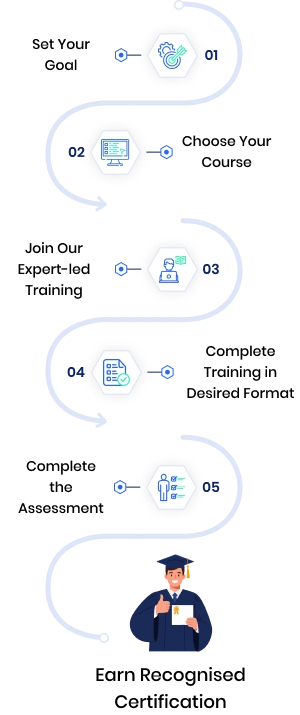Course Overview O v e r v i e w
- Course Overview
- Course Outline
- What’s Included
- What You’ll Learn
- Exam Details
ITIL® 4 Foundation Certification Course Overview
The ITIL® 4 Foundation Certification provides a strong understanding of IT Service Management (ITSM) principles and the ITIL framework. It introduces learners to service value systems, guidelines, and practices that enable organisations to deliver efficient and reliable IT services.
Formal ITIL® training helps professionals apply best practices confidently. It enhances communication, promotes collaboration between IT and business teams, and improves service delivery quality, making certified individuals key contributors to organisational success.
At Training Deals, we offer ITIL® 4 Foundation training that is practical, flexible, and industry-focused. Our expert trainers bring hands-on experience and real-world insights, ensuring every session is engaging and relevant. With affordable pricing and dedicated learner support, we help you strengthen your ITSM expertise.

ITIL® 4 Foundation Certification Course Outline
Module 1: Introduction
What is ITIL®?
ITIL® 4 Certification Journey
Course Objectives
About the Course
Module 2: Key Concepts of Service Management
Concept of Value
What Do We Mean by Value?
Definition of Value
What is an Organisation?
How is Value Created Between Organisations?
Service Relationships
Providers and Consumers Co-Create Value
Stakeholder and Service Consumer Roles
Stakeholders
Service Provider Organisations
Service Consumer Organisations
Other Stakeholders
How is Value Created?
Service Consumer Roles
Activity
Service Offerings
What is a Product?
What is a Service?
What is a Service Offering?
Creating Value with Services
Value Co-Creation
Service Provider
What are Service Consumers?
What are Products and Services?
Definitions
What are Service Relationships?
What is the Meaning of Service Provision?
What is Service Consumption?
Service Relationship Management
How Organisations Co-Create Value?
Service Relationship Model
Value, Outcomes, Costs, and Risk
Definitions
What Can Be Described as Utility and Warranty?
Review and Reflect
Quiz
Module 3: Key Concepts of ITIL® 4
Four Dimensions of Service Management
Holistic Approach to Service Management
Four Dimensions of Service Management
Organisations and People
What do the Dimensions Includes?
What is Culture, and Why is it Needed?
What a Supportive Culture Requires?
What to Pay Attention to?
Organisational Complexities
Information and Technology
Things to Consider
Partners and Suppliers
Organisations and their Partners and Suppliers
Forms of Cooperation
What Goes into Supplier Strategy?
What is a Value Stream?
Value Streams and Processes
Questions to create, deliver and improve
Activity
ITIL® Service Value System
ITIL® SVS
ITIL® SVS Inputs
Governance
Challenges of Silos
Need for Continual Improvement
Applying the SVS
Service Value Chain
Introduction to the ITIL® Service Value Chain
Opportunity Vs Demand
Converting Inputs into Outputs
Service Value Chain, its Practices, and Value Streams
Activities
Review and Reflect Quiz
Module 4: Guiding Principles
Introduction to the Guiding Principles
What is a Guiding Principle?
Focus on Value
How is Value is Perceived?
CX and UX
How Would You Apply this Principle?
Start Where You Are
Assess Where You Are
Role of Measurement
Applying the Principle
Progress Iteratively with Feedback
Role of Feedback
Use of Feedback Loops
Iteration and Feedback Together
Collaborate and Promote Visibility
Communication and Visibility
Key Collaboration Pairs
Promote Visibility
Think and Work Holistically
Keep it Simple and Practical
Judging What to Keep
Conflicting Objectives
Applying the Principle
Optimise and Automate
Road to Optimisation
Using Automation
Applying the Principle
Activity: Case Studies
Using the Guiding Principles
Guiding Principles in Context
Guiding Principles Your Examples
Principle Interaction
Applying the Guiding Principles
Guiding Principles: Task
Principle Interaction
Review and Reflect Quiz
Extension Activity 2
Module 5: ITIL® 4 Management Practices
Purpose of the ITIL® Practices
Management Practices
34 ITIL® Management Practices
General Management Practices
Service Management Practices
Technical Management Practices
Overview of Eight ITIL® Practices
Eight Practices
Information Security Management
Contribution of Information Security Management to SVC
Relationship Management
Supplier Management
Evaluating and Selecting Suppliers
Contribution of Supplier Management to SVC
IT Asset Management
Contribution of IT Asset Management to SVC
Service Configuration Management
Contribution of Service Configuration Management to SVC
Monitoring and Event Management
Contribution of Monitoring and Event Management to SVC
Deployment Management
Approaches for Deployment
Contribution of Deployment Management to SVC
Release Management
Contribution of Release Management to SVC
Key Management Practices – Part 1
What is an Incident?
Incident Management Guidance
Incident Management Tools
Incident Updates
Types of Incidents
Collaboration
Swarming
Third-Party Products and Services
Incident Management Contribution to SVC
Service Request Management
What is a Service Request?
Steps for Request Fulfilment
Request Processes and Procedures
Service Request Management Contribution to the SVC
Methods of Fulfilling Requests
Service Desk
Automation
Task: Service Desk ‘Pitch’
Service Desk Provisions
Service Desk Support
Service Desk Skills
Service Desk Contribution to the SVC
Key Management Practices – Part 2
Problem Management
Phases of Problem Management
Identifying a Problem
Problem Control
Workaround
Error Control
Links to Other Practices
Interfaces
Problem Management Contribution to the SVC
Continual Improvement
Applying Continual Improvement
Continual Improvement Model
What is the Vision?
Where are We Now?
Where do We Want to Be?
CSFs and KPIs
How do We get There?
Take Action
Did we Get There?
How do We Keep the Momentum?
Methods to Continually Improve
Continual Improvement Activity
Tracking
CI Responsibility
Continual Improvement Contribution to the SVC
Key Management Practices – Part 3
Service Level Management
Activity
Service Level Agreements
Key requirements for SLAs
Watermelon SLA Effect
Customer Engagement
Customer Feedback
Metrics
Service Level Management Contribution to the SVC
Change Enablement
Define Change
Scope of Change Enablement
Change Authority
Types of Change
Scheduling
Change Enablement Contribution to the SVC
Review and Reflect
Quiz
Activities
Course Review
What’s Next?

What’s included in this ITIL® 4 Foundation Certification Course?
- Expert-led Training Sessions by Certified Instructors
- ITIL® 4 Foundation Exam
- Digital Delegate Pack
What You’ll Learn in this Course
This course takes you from understanding ITIL® 4 principles to applying practical IT Service Management (ITSM) frameworks for delivering value in modern digital environments. Each stage builds the knowledge and confidence needed to manage IT services effectively.
Learn the key concepts, principles, and practices of ITIL® 4
Learn how ITIL® supports effective service management and business alignment
Learn the components of the ITIL® service value system and value chain
Learn to improve communication and collaboration between IT and business teams
Learn how continual improvement drives service excellence and customer satisfaction
Learn to apply ITIL® practices for stability, efficiency, and value delivery

ITIL® 4 Foundation Exam Information
The ITIL® 4 Foundation Certification Exam assesses candidates’ understanding of key ITIL® concepts, principles, and practices within the IT Service Management framework. The format of the exam is as follows:
Question Type: Multiple Choice
Total Questions: 40
Total Marks: 40 Marks
Pass Mark: 65% or 26/40 Marks
Duration: 60 minutes
Type: Closed Book

Our Upcoming Batches
Wed 4 Feb 2026 - Thu 5 Feb 2026
Duration: 2 Days
Mon 9 Feb 2026 - Tue 10 Feb 2026
Duration: 2 Days
Wed 11 Feb 2026 - Thu 12 Feb 2026
Duration: 2 Days
Mon 16 Feb 2026 - Tue 17 Feb 2026
Duration: 2 Days
Mon 9 Feb 2026 - Tue 10 Feb 2026
Duration: 2 Days Nottingham
Mon 18 May 2026 - Tue 19 May 2026
Duration: 2 Days Nottingham
Mon 24 Aug 2026 - Tue 25 Aug 2026
Duration: 2 Days Nottingham
Mon 16 Nov 2026 - Tue 17 Nov 2026
Duration: 2 Days Nottingham
Request More Information

Corporate Training
Elevate your workforce with expert-led corporate training that enhances skills, boosts productivity, and aligns teams with your business goals.

Individuals Training
Unlock personal growth and sharpen professional skills with tailored training designed to build your confidence and career success.
Your Path to Professional Recognition
Our path is designed to guide you through each stage with clarity, support and practical learning, helping you achieve your goals with confidence.

Step Forward with Globally Recognised Certification
A recognised certification is more than a credential. It’s proof of your commitment to professional excellence, providing you with the credibility, confidence, and global reach to advance your career in exciting new directions.
Globally Certified Professionals Over Time
Career Growth
81%Certified professionals reported receiving a promotion after earning their certification.
Global Opportunities
89%Certified professionals experienced access to new career opportunities, including leadership roles and global positions.
Not able to find what you are looking for
Our experts will guide you to the right course from thousands worldwide: tailored to your goals.
Frequently Asked Questions
It is an entry-level certification introducing ITIL® 4 principles, concepts, and practices to support effective IT Service Management in modern business environments.
It helps professionals build a solid ITSM foundation, improving service quality, collaboration, and value delivery across organisations.
It is ideal for IT Professionals, Service Managers, Support Staff, and individuals aspiring to build or advance a career in IT Service Management.
Yes, ITIL® practices are widely used in IT, finance, healthcare, education, telecommunications, and other service-based industries.
It equips learners with ITIL® principles to support efficient service delivery, process improvement, and continual enhancement.
What Our Customers Say About Us
 Matthew Sullivan
HR Business Partner
Matthew Sullivan
HR Business Partner
Our HR team registered for the Change Management Foundation & Practitioner Training Course, and it couldn’t have been more valuable. The team gained practical frameworks to guide employees smoothly through transitions with confidence.
 Olivia Barrett
Operations Manager
Olivia Barrett
Operations Manager
Our operations staff completed the Lean Six Sigma Green Belt Training Course, and it has been transformative. We can now identify inefficiencies quickly, and the tools we learned are already improving performance across the team.
 Benjamin Foster
Product Manager
Benjamin Foster
Product Manager
Our product team took part in the Agile Project Management Foundation & Practitioner (AgilePM®) Training Course, and the difference is remarkable. We’re now more adaptive, collaborative, and efficient in managing change.
 Lucy Harper
IT Support Lead
Lucy Harper
IT Support Lead
Our IT support unit attended the ITIL® 4 Foundation Training Course, and the results have been impressive. Processes are smoother, collaboration has improved, and the team finally speaks a common language of service management.
 Edward Clarke
Programme Manager
Edward Clarke
Programme Manager
We joined the PMP® Certification Training Course as a leadership group, and it was outstanding. The trainer made every concept practical, and the exam preparation resources helped the whole team feel ready to tackle complex projects.
 Amelia Rhodes
Project Officer
Amelia Rhodes
Project Officer
Our project office completed the PRINCE2® Foundation & Practitioner Training Course, and it has brought real clarity to how we manage projects. The trainer’s examples were excellent, and the team now follows a structured approach with confidence.

























